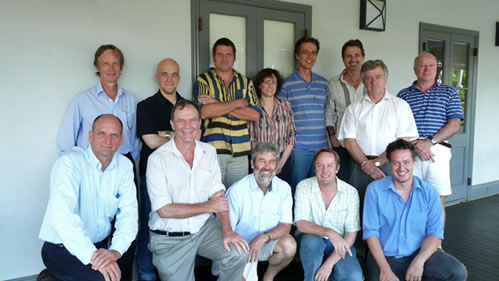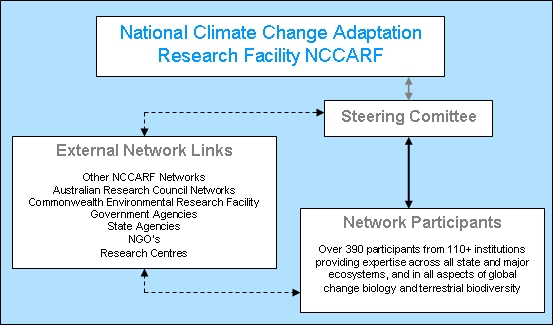The steering committee for the Terrestrial Biodiversity Adaptation Research Network includes some of the most eminent climate change biologists in Australia including two ARC Federation Fellows. Additional expertise and perspectives are provided by a number of distinguished international contributors. The depth and diversity of experience, expertise and knowledge represented by this committee will ensure the success of this network and was chosen to provide representation across states, ecosystems and disciplines.

The Terrestrial Biodiversity Research Network Steering Committee - February 2009
Clockwise from top left: Trevor Booth, Barry Brook, Dick Williams, Lesley Hughes, Ary Hoffman, Steve Williams, Roger Kitching, Bob Pressey, Andrew Lowe, Hugh Possingham, Grant Wardell-Johnson, Stephen Garnett, David Bowman
| Table 1: Full list of Steering Committee members, listed alphabetically, with affiliation. | ||
| Title | Name | Institute |
| Prof | Bowman, David | University of Tasmania |
| Dr | Bridle, Kerry | University of Tasmania |
| Prof | Brook, Barry | University of Adelaide |
| Dr | Chambers, Lynda | Australian Bureau of Meteorology |
| Prof | Garnett, Stephen | Charles Darwin University |
| A/Prof | Hero, Jean-Marc | Griffith University |
| Prof | Hoffmann, Ary | University of Melbourne |
| Prof | Hughes, Lesley | Macquarie University |
| James, Craig | CSIRO | |
| Prof | Kitching, Roger | Griffith University |
| Prof | Lowe, Andrew | University of Adelaide |
| Asst.Prof | Mitchell, Nicola | University of Western Australia |
| Prof | Moritz, Craig | Berkeley Museum, UC - Berkeley |
| Prof | Possingham, Hugh | University of Queensland |
| Prof | Pressey, Bob | James Cook University |
| A/Prof | Wardell-Johnson, Grant | Curtin University |
| Dr | Williams, Dick | CSIRO - Darwin, NT |
| Prof | Williams, Stephen | James Cook University |
| Yates, Colin | Dept. Environment and Conservation, WA | |
Collaborators
Although still in its fledgling stage, this network already includes over 390 experts across 110+ institutions and includes state and federal biodiversity groups. Key researchers and organisations around the globe have committed to be part of the network. We have strategically included expertise in a variety of fields and disciplines, from ecology and biodiversity to mathematical modeling, policy and conservation planning. We have explicitly invited membership and participation in the network from resource management and policy groups and will continue to develop these links in all states and at the national level.
Functional Structure
The functional structure of the network consists of the combined expertise of the full network and a steering committee to provide overall management and guidance to the network with representation across the major nodes, ecosystems, states and areas of expertise.




 Steering Committee
Steering Committee
